Research Project on Digital Technology and Business (Task 2, 3 & 4)
VerifiedAdded on 2020/12/30
|18
|3597
|53
Report
AI Summary
This research project investigates the impact of digital technology on business operations, focusing on the travel and tourism sector with a case study on Thomas Cook group. The report outlines the research methodology, including resource allocation, research design (descriptive), philosophy (interpretivism), approach (deductive), and techniques (quantitative and qualitative). Data collection methods such as primary data collection using questionnaires are discussed, followed by data analysis techniques including thematic analysis. The findings, based on responses from Thomas Cook employees, reveal the importance of digital technology, its effective use within the firm, its impact on thinking and learning, and its positive influence on business functions and client satisfaction. The study also addresses ethical considerations, reliability, and validity, providing a comprehensive analysis of digital technology's role in modern business.
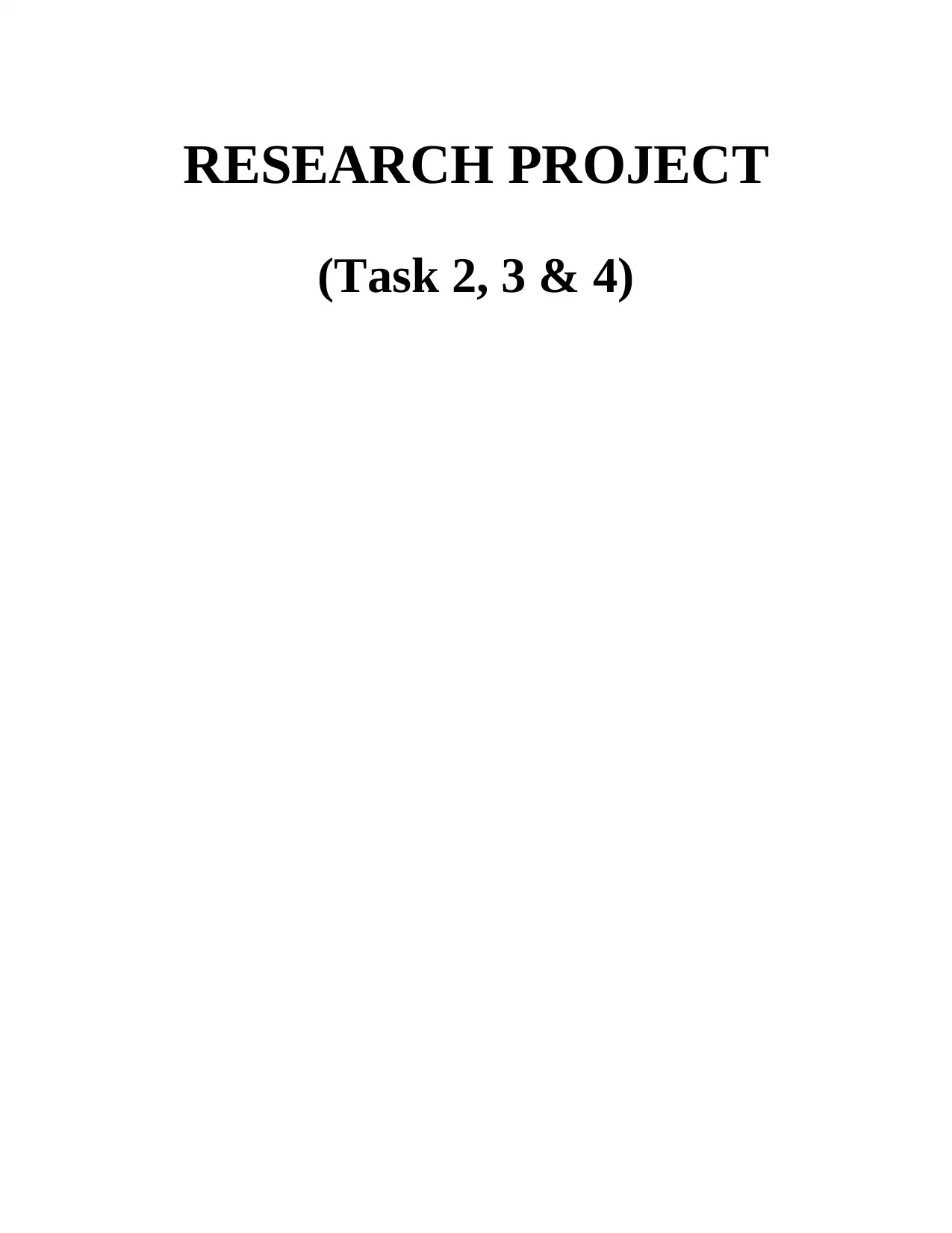
RESEARCH PROJECT
(Task 2, 3 & 4)
(Task 2, 3 & 4)
Paraphrase This Document
Need a fresh take? Get an instant paraphrase of this document with our AI Paraphraser
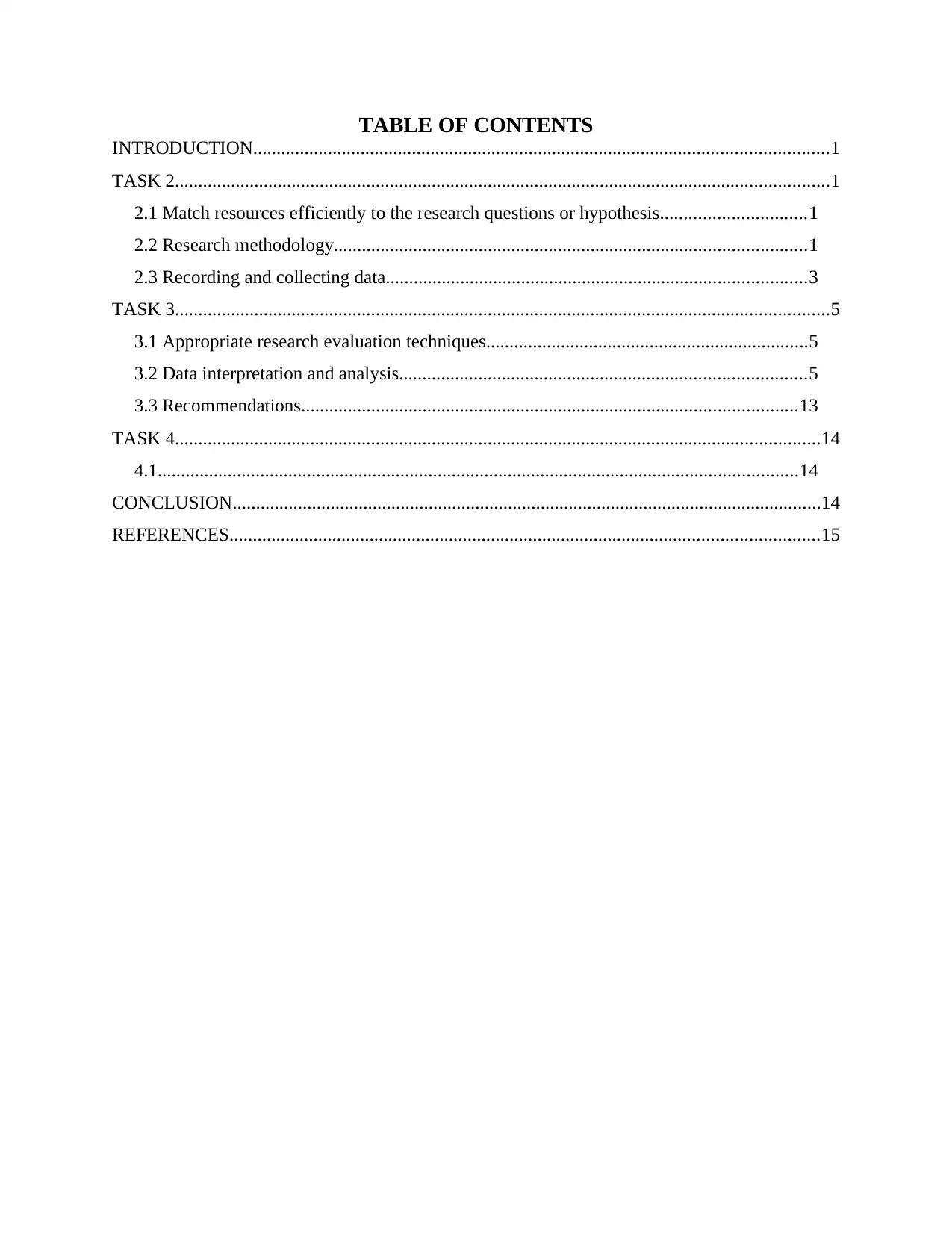
TABLE OF CONTENTS
INTRODUCTION...........................................................................................................................1
TASK 2............................................................................................................................................1
2.1 Match resources efficiently to the research questions or hypothesis...............................1
2.2 Research methodology.....................................................................................................1
2.3 Recording and collecting data..........................................................................................3
TASK 3............................................................................................................................................5
3.1 Appropriate research evaluation techniques.....................................................................5
3.2 Data interpretation and analysis.......................................................................................5
3.3 Recommendations..........................................................................................................13
TASK 4..........................................................................................................................................14
4.1.........................................................................................................................................14
CONCLUSION..............................................................................................................................14
REFERENCES..............................................................................................................................15
INTRODUCTION...........................................................................................................................1
TASK 2............................................................................................................................................1
2.1 Match resources efficiently to the research questions or hypothesis...............................1
2.2 Research methodology.....................................................................................................1
2.3 Recording and collecting data..........................................................................................3
TASK 3............................................................................................................................................5
3.1 Appropriate research evaluation techniques.....................................................................5
3.2 Data interpretation and analysis.......................................................................................5
3.3 Recommendations..........................................................................................................13
TASK 4..........................................................................................................................................14
4.1.........................................................................................................................................14
CONCLUSION..............................................................................................................................14
REFERENCES..............................................................................................................................15
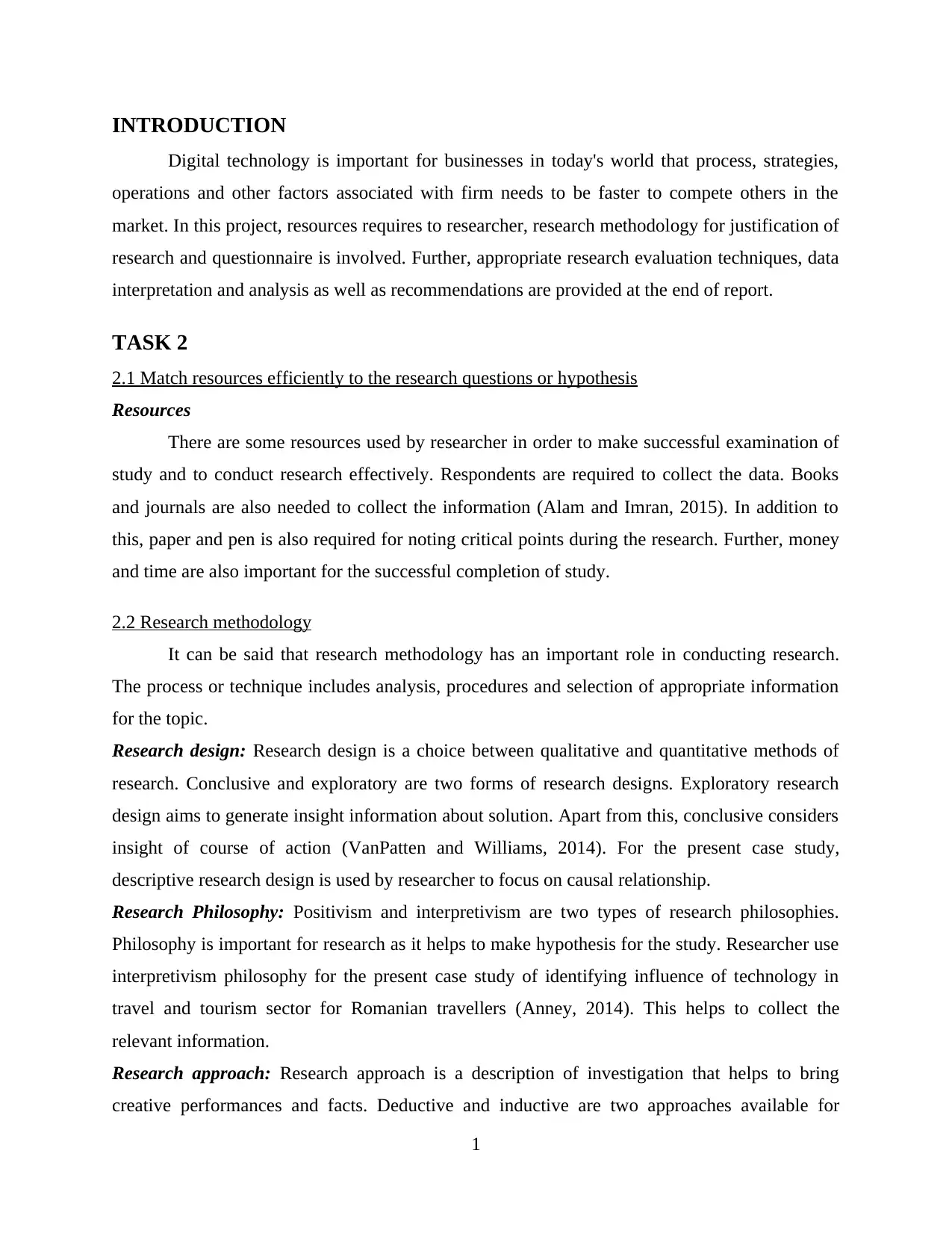
INTRODUCTION
Digital technology is important for businesses in today's world that process, strategies,
operations and other factors associated with firm needs to be faster to compete others in the
market. In this project, resources requires to researcher, research methodology for justification of
research and questionnaire is involved. Further, appropriate research evaluation techniques, data
interpretation and analysis as well as recommendations are provided at the end of report.
TASK 2
2.1 Match resources efficiently to the research questions or hypothesis
Resources
There are some resources used by researcher in order to make successful examination of
study and to conduct research effectively. Respondents are required to collect the data. Books
and journals are also needed to collect the information (Alam and Imran, 2015). In addition to
this, paper and pen is also required for noting critical points during the research. Further, money
and time are also important for the successful completion of study.
2.2 Research methodology
It can be said that research methodology has an important role in conducting research.
The process or technique includes analysis, procedures and selection of appropriate information
for the topic.
Research design: Research design is a choice between qualitative and quantitative methods of
research. Conclusive and exploratory are two forms of research designs. Exploratory research
design aims to generate insight information about solution. Apart from this, conclusive considers
insight of course of action (VanPatten and Williams, 2014). For the present case study,
descriptive research design is used by researcher to focus on causal relationship.
Research Philosophy: Positivism and interpretivism are two types of research philosophies.
Philosophy is important for research as it helps to make hypothesis for the study. Researcher use
interpretivism philosophy for the present case study of identifying influence of technology in
travel and tourism sector for Romanian travellers (Anney, 2014). This helps to collect the
relevant information.
Research approach: Research approach is a description of investigation that helps to bring
creative performances and facts. Deductive and inductive are two approaches available for
1
Digital technology is important for businesses in today's world that process, strategies,
operations and other factors associated with firm needs to be faster to compete others in the
market. In this project, resources requires to researcher, research methodology for justification of
research and questionnaire is involved. Further, appropriate research evaluation techniques, data
interpretation and analysis as well as recommendations are provided at the end of report.
TASK 2
2.1 Match resources efficiently to the research questions or hypothesis
Resources
There are some resources used by researcher in order to make successful examination of
study and to conduct research effectively. Respondents are required to collect the data. Books
and journals are also needed to collect the information (Alam and Imran, 2015). In addition to
this, paper and pen is also required for noting critical points during the research. Further, money
and time are also important for the successful completion of study.
2.2 Research methodology
It can be said that research methodology has an important role in conducting research.
The process or technique includes analysis, procedures and selection of appropriate information
for the topic.
Research design: Research design is a choice between qualitative and quantitative methods of
research. Conclusive and exploratory are two forms of research designs. Exploratory research
design aims to generate insight information about solution. Apart from this, conclusive considers
insight of course of action (VanPatten and Williams, 2014). For the present case study,
descriptive research design is used by researcher to focus on causal relationship.
Research Philosophy: Positivism and interpretivism are two types of research philosophies.
Philosophy is important for research as it helps to make hypothesis for the study. Researcher use
interpretivism philosophy for the present case study of identifying influence of technology in
travel and tourism sector for Romanian travellers (Anney, 2014). This helps to collect the
relevant information.
Research approach: Research approach is a description of investigation that helps to bring
creative performances and facts. Deductive and inductive are two approaches available for
1
⊘ This is a preview!⊘
Do you want full access?
Subscribe today to unlock all pages.

Trusted by 1+ million students worldwide
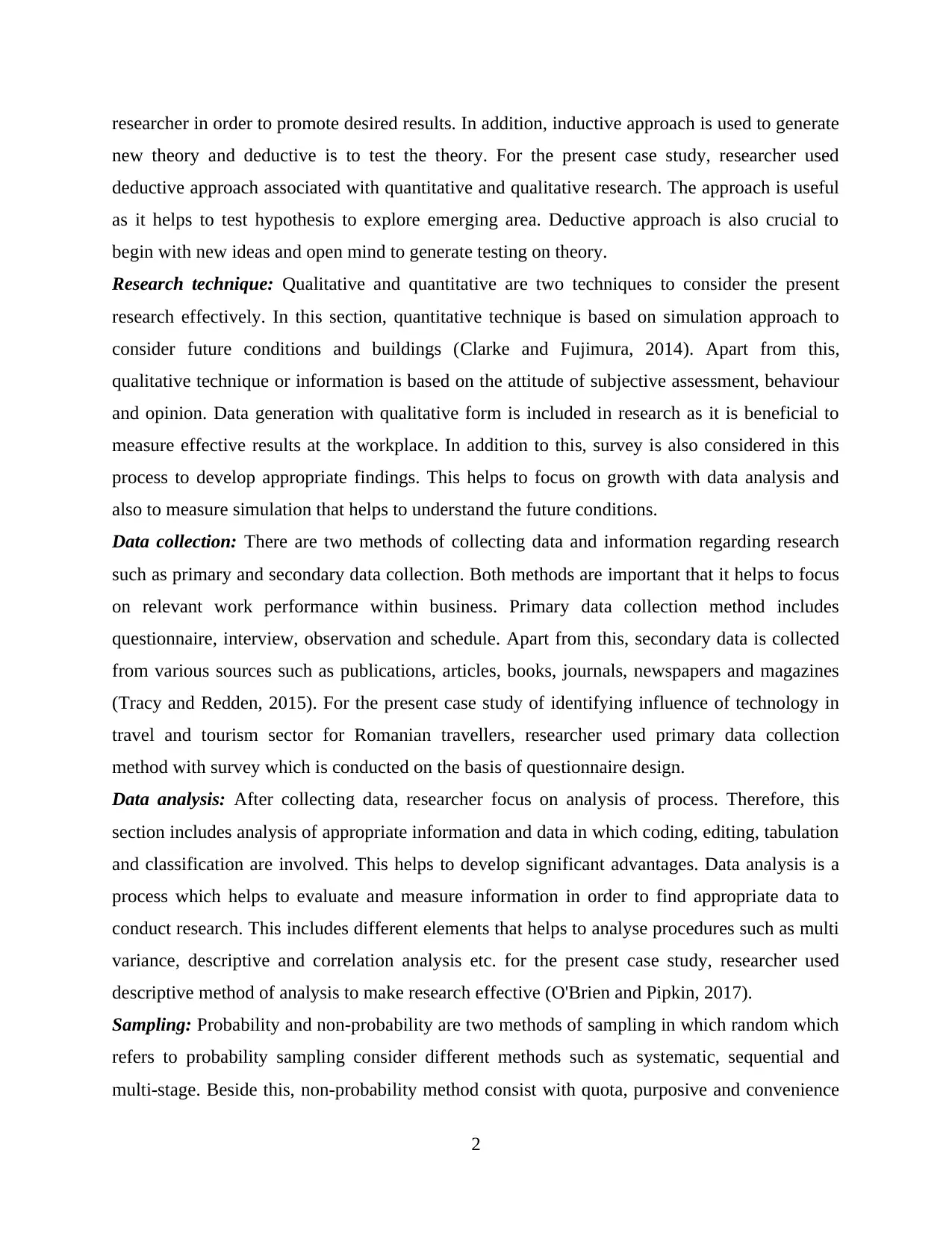
researcher in order to promote desired results. In addition, inductive approach is used to generate
new theory and deductive is to test the theory. For the present case study, researcher used
deductive approach associated with quantitative and qualitative research. The approach is useful
as it helps to test hypothesis to explore emerging area. Deductive approach is also crucial to
begin with new ideas and open mind to generate testing on theory.
Research technique: Qualitative and quantitative are two techniques to consider the present
research effectively. In this section, quantitative technique is based on simulation approach to
consider future conditions and buildings (Clarke and Fujimura, 2014). Apart from this,
qualitative technique or information is based on the attitude of subjective assessment, behaviour
and opinion. Data generation with qualitative form is included in research as it is beneficial to
measure effective results at the workplace. In addition to this, survey is also considered in this
process to develop appropriate findings. This helps to focus on growth with data analysis and
also to measure simulation that helps to understand the future conditions.
Data collection: There are two methods of collecting data and information regarding research
such as primary and secondary data collection. Both methods are important that it helps to focus
on relevant work performance within business. Primary data collection method includes
questionnaire, interview, observation and schedule. Apart from this, secondary data is collected
from various sources such as publications, articles, books, journals, newspapers and magazines
(Tracy and Redden, 2015). For the present case study of identifying influence of technology in
travel and tourism sector for Romanian travellers, researcher used primary data collection
method with survey which is conducted on the basis of questionnaire design.
Data analysis: After collecting data, researcher focus on analysis of process. Therefore, this
section includes analysis of appropriate information and data in which coding, editing, tabulation
and classification are involved. This helps to develop significant advantages. Data analysis is a
process which helps to evaluate and measure information in order to find appropriate data to
conduct research. This includes different elements that helps to analyse procedures such as multi
variance, descriptive and correlation analysis etc. for the present case study, researcher used
descriptive method of analysis to make research effective (O'Brien and Pipkin, 2017).
Sampling: Probability and non-probability are two methods of sampling in which random which
refers to probability sampling consider different methods such as systematic, sequential and
multi-stage. Beside this, non-probability method consist with quota, purposive and convenience
2
new theory and deductive is to test the theory. For the present case study, researcher used
deductive approach associated with quantitative and qualitative research. The approach is useful
as it helps to test hypothesis to explore emerging area. Deductive approach is also crucial to
begin with new ideas and open mind to generate testing on theory.
Research technique: Qualitative and quantitative are two techniques to consider the present
research effectively. In this section, quantitative technique is based on simulation approach to
consider future conditions and buildings (Clarke and Fujimura, 2014). Apart from this,
qualitative technique or information is based on the attitude of subjective assessment, behaviour
and opinion. Data generation with qualitative form is included in research as it is beneficial to
measure effective results at the workplace. In addition to this, survey is also considered in this
process to develop appropriate findings. This helps to focus on growth with data analysis and
also to measure simulation that helps to understand the future conditions.
Data collection: There are two methods of collecting data and information regarding research
such as primary and secondary data collection. Both methods are important that it helps to focus
on relevant work performance within business. Primary data collection method includes
questionnaire, interview, observation and schedule. Apart from this, secondary data is collected
from various sources such as publications, articles, books, journals, newspapers and magazines
(Tracy and Redden, 2015). For the present case study of identifying influence of technology in
travel and tourism sector for Romanian travellers, researcher used primary data collection
method with survey which is conducted on the basis of questionnaire design.
Data analysis: After collecting data, researcher focus on analysis of process. Therefore, this
section includes analysis of appropriate information and data in which coding, editing, tabulation
and classification are involved. This helps to develop significant advantages. Data analysis is a
process which helps to evaluate and measure information in order to find appropriate data to
conduct research. This includes different elements that helps to analyse procedures such as multi
variance, descriptive and correlation analysis etc. for the present case study, researcher used
descriptive method of analysis to make research effective (O'Brien and Pipkin, 2017).
Sampling: Probability and non-probability are two methods of sampling in which random which
refers to probability sampling consider different methods such as systematic, sequential and
multi-stage. Beside this, non-probability method consist with quota, purposive and convenience
2
Paraphrase This Document
Need a fresh take? Get an instant paraphrase of this document with our AI Paraphraser
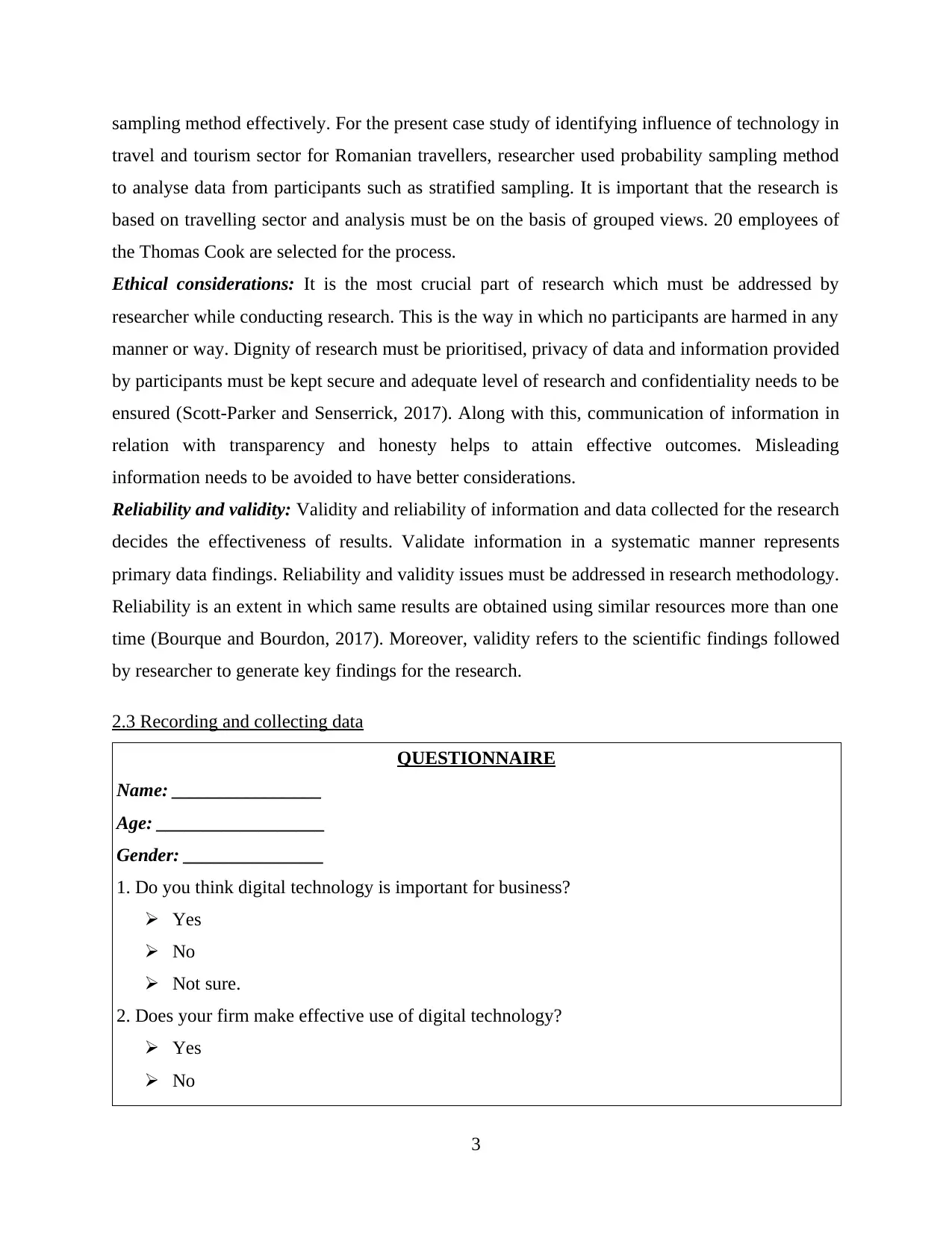
sampling method effectively. For the present case study of identifying influence of technology in
travel and tourism sector for Romanian travellers, researcher used probability sampling method
to analyse data from participants such as stratified sampling. It is important that the research is
based on travelling sector and analysis must be on the basis of grouped views. 20 employees of
the Thomas Cook are selected for the process.
Ethical considerations: It is the most crucial part of research which must be addressed by
researcher while conducting research. This is the way in which no participants are harmed in any
manner or way. Dignity of research must be prioritised, privacy of data and information provided
by participants must be kept secure and adequate level of research and confidentiality needs to be
ensured (Scott-Parker and Senserrick, 2017). Along with this, communication of information in
relation with transparency and honesty helps to attain effective outcomes. Misleading
information needs to be avoided to have better considerations.
Reliability and validity: Validity and reliability of information and data collected for the research
decides the effectiveness of results. Validate information in a systematic manner represents
primary data findings. Reliability and validity issues must be addressed in research methodology.
Reliability is an extent in which same results are obtained using similar resources more than one
time (Bourque and Bourdon, 2017). Moreover, validity refers to the scientific findings followed
by researcher to generate key findings for the research.
2.3 Recording and collecting data
QUESTIONNAIRE
Name: ________________
Age: __________________
Gender: _______________
1. Do you think digital technology is important for business?
Yes
No
Not sure.
2. Does your firm make effective use of digital technology?
Yes
No
3
travel and tourism sector for Romanian travellers, researcher used probability sampling method
to analyse data from participants such as stratified sampling. It is important that the research is
based on travelling sector and analysis must be on the basis of grouped views. 20 employees of
the Thomas Cook are selected for the process.
Ethical considerations: It is the most crucial part of research which must be addressed by
researcher while conducting research. This is the way in which no participants are harmed in any
manner or way. Dignity of research must be prioritised, privacy of data and information provided
by participants must be kept secure and adequate level of research and confidentiality needs to be
ensured (Scott-Parker and Senserrick, 2017). Along with this, communication of information in
relation with transparency and honesty helps to attain effective outcomes. Misleading
information needs to be avoided to have better considerations.
Reliability and validity: Validity and reliability of information and data collected for the research
decides the effectiveness of results. Validate information in a systematic manner represents
primary data findings. Reliability and validity issues must be addressed in research methodology.
Reliability is an extent in which same results are obtained using similar resources more than one
time (Bourque and Bourdon, 2017). Moreover, validity refers to the scientific findings followed
by researcher to generate key findings for the research.
2.3 Recording and collecting data
QUESTIONNAIRE
Name: ________________
Age: __________________
Gender: _______________
1. Do you think digital technology is important for business?
Yes
No
Not sure.
2. Does your firm make effective use of digital technology?
Yes
No
3
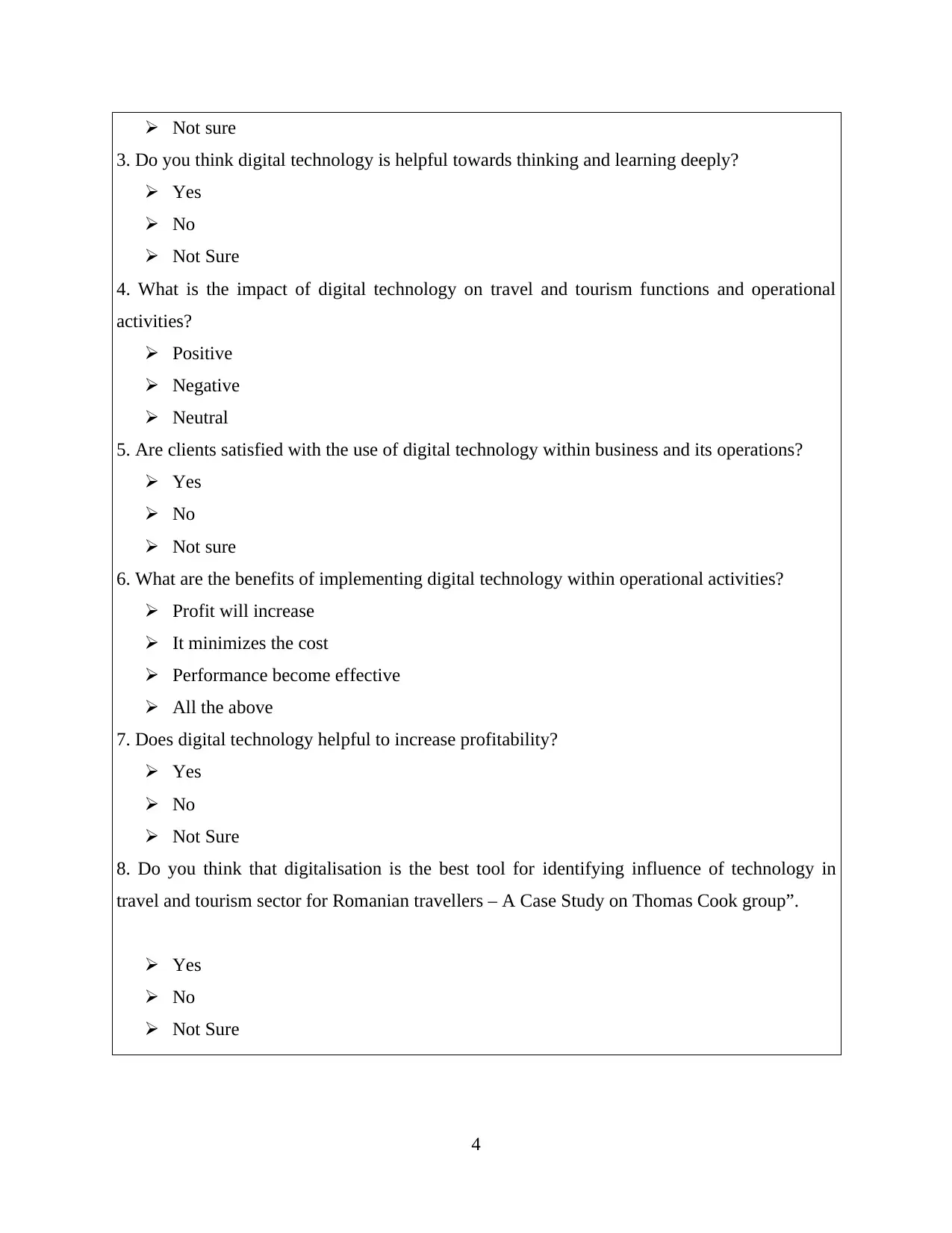
Not sure
3. Do you think digital technology is helpful towards thinking and learning deeply?
Yes
No
Not Sure
4. What is the impact of digital technology on travel and tourism functions and operational
activities?
Positive
Negative
Neutral
5. Are clients satisfied with the use of digital technology within business and its operations?
Yes
No
Not sure
6. What are the benefits of implementing digital technology within operational activities?
Profit will increase
It minimizes the cost
Performance become effective
All the above
7. Does digital technology helpful to increase profitability?
Yes
No
Not Sure
8. Do you think that digitalisation is the best tool for identifying influence of technology in
travel and tourism sector for Romanian travellers – A Case Study on Thomas Cook group”.
Yes
No
Not Sure
4
3. Do you think digital technology is helpful towards thinking and learning deeply?
Yes
No
Not Sure
4. What is the impact of digital technology on travel and tourism functions and operational
activities?
Positive
Negative
Neutral
5. Are clients satisfied with the use of digital technology within business and its operations?
Yes
No
Not sure
6. What are the benefits of implementing digital technology within operational activities?
Profit will increase
It minimizes the cost
Performance become effective
All the above
7. Does digital technology helpful to increase profitability?
Yes
No
Not Sure
8. Do you think that digitalisation is the best tool for identifying influence of technology in
travel and tourism sector for Romanian travellers – A Case Study on Thomas Cook group”.
Yes
No
Not Sure
4
⊘ This is a preview!⊘
Do you want full access?
Subscribe today to unlock all pages.

Trusted by 1+ million students worldwide
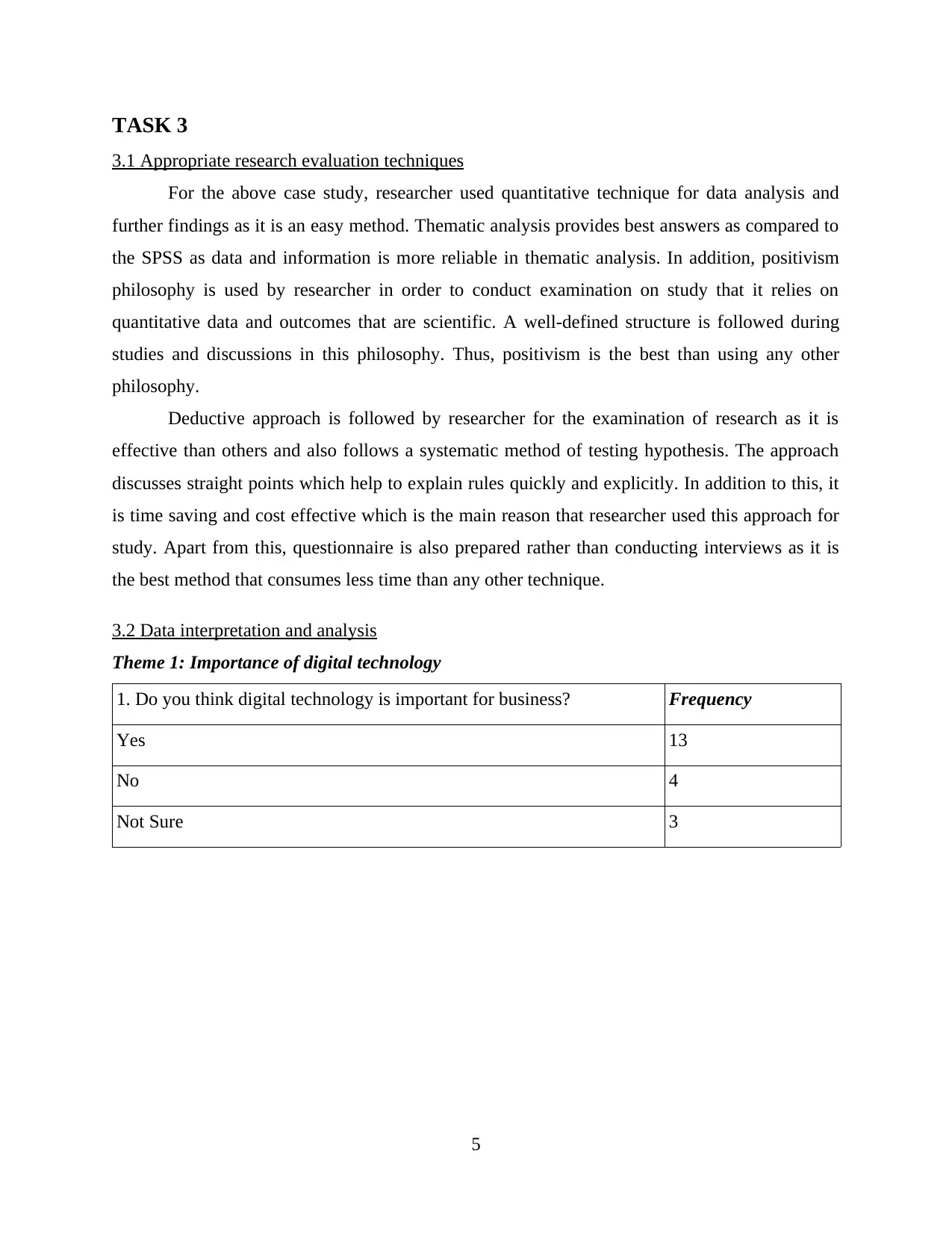
TASK 3
3.1 Appropriate research evaluation techniques
For the above case study, researcher used quantitative technique for data analysis and
further findings as it is an easy method. Thematic analysis provides best answers as compared to
the SPSS as data and information is more reliable in thematic analysis. In addition, positivism
philosophy is used by researcher in order to conduct examination on study that it relies on
quantitative data and outcomes that are scientific. A well-defined structure is followed during
studies and discussions in this philosophy. Thus, positivism is the best than using any other
philosophy.
Deductive approach is followed by researcher for the examination of research as it is
effective than others and also follows a systematic method of testing hypothesis. The approach
discusses straight points which help to explain rules quickly and explicitly. In addition to this, it
is time saving and cost effective which is the main reason that researcher used this approach for
study. Apart from this, questionnaire is also prepared rather than conducting interviews as it is
the best method that consumes less time than any other technique.
3.2 Data interpretation and analysis
Theme 1: Importance of digital technology
1. Do you think digital technology is important for business? Frequency
Yes 13
No 4
Not Sure 3
5
3.1 Appropriate research evaluation techniques
For the above case study, researcher used quantitative technique for data analysis and
further findings as it is an easy method. Thematic analysis provides best answers as compared to
the SPSS as data and information is more reliable in thematic analysis. In addition, positivism
philosophy is used by researcher in order to conduct examination on study that it relies on
quantitative data and outcomes that are scientific. A well-defined structure is followed during
studies and discussions in this philosophy. Thus, positivism is the best than using any other
philosophy.
Deductive approach is followed by researcher for the examination of research as it is
effective than others and also follows a systematic method of testing hypothesis. The approach
discusses straight points which help to explain rules quickly and explicitly. In addition to this, it
is time saving and cost effective which is the main reason that researcher used this approach for
study. Apart from this, questionnaire is also prepared rather than conducting interviews as it is
the best method that consumes less time than any other technique.
3.2 Data interpretation and analysis
Theme 1: Importance of digital technology
1. Do you think digital technology is important for business? Frequency
Yes 13
No 4
Not Sure 3
5
Paraphrase This Document
Need a fresh take? Get an instant paraphrase of this document with our AI Paraphraser
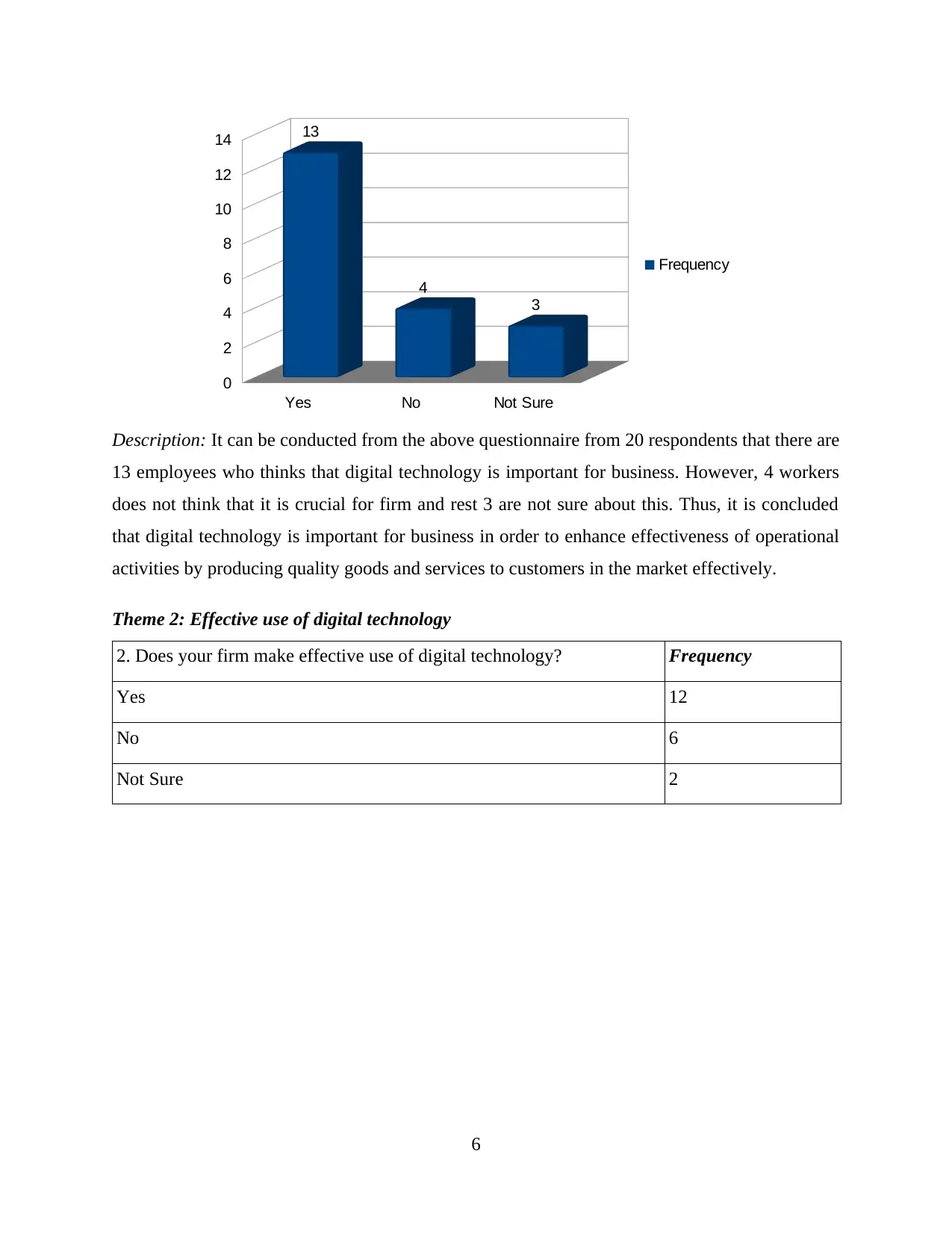
Description: It can be conducted from the above questionnaire from 20 respondents that there are
13 employees who thinks that digital technology is important for business. However, 4 workers
does not think that it is crucial for firm and rest 3 are not sure about this. Thus, it is concluded
that digital technology is important for business in order to enhance effectiveness of operational
activities by producing quality goods and services to customers in the market effectively.
Theme 2: Effective use of digital technology
2. Does your firm make effective use of digital technology? Frequency
Yes 12
No 6
Not Sure 2
6
Yes No Not Sure
0
2
4
6
8
10
12
14 13
4
3
Frequency
13 employees who thinks that digital technology is important for business. However, 4 workers
does not think that it is crucial for firm and rest 3 are not sure about this. Thus, it is concluded
that digital technology is important for business in order to enhance effectiveness of operational
activities by producing quality goods and services to customers in the market effectively.
Theme 2: Effective use of digital technology
2. Does your firm make effective use of digital technology? Frequency
Yes 12
No 6
Not Sure 2
6
Yes No Not Sure
0
2
4
6
8
10
12
14 13
4
3
Frequency
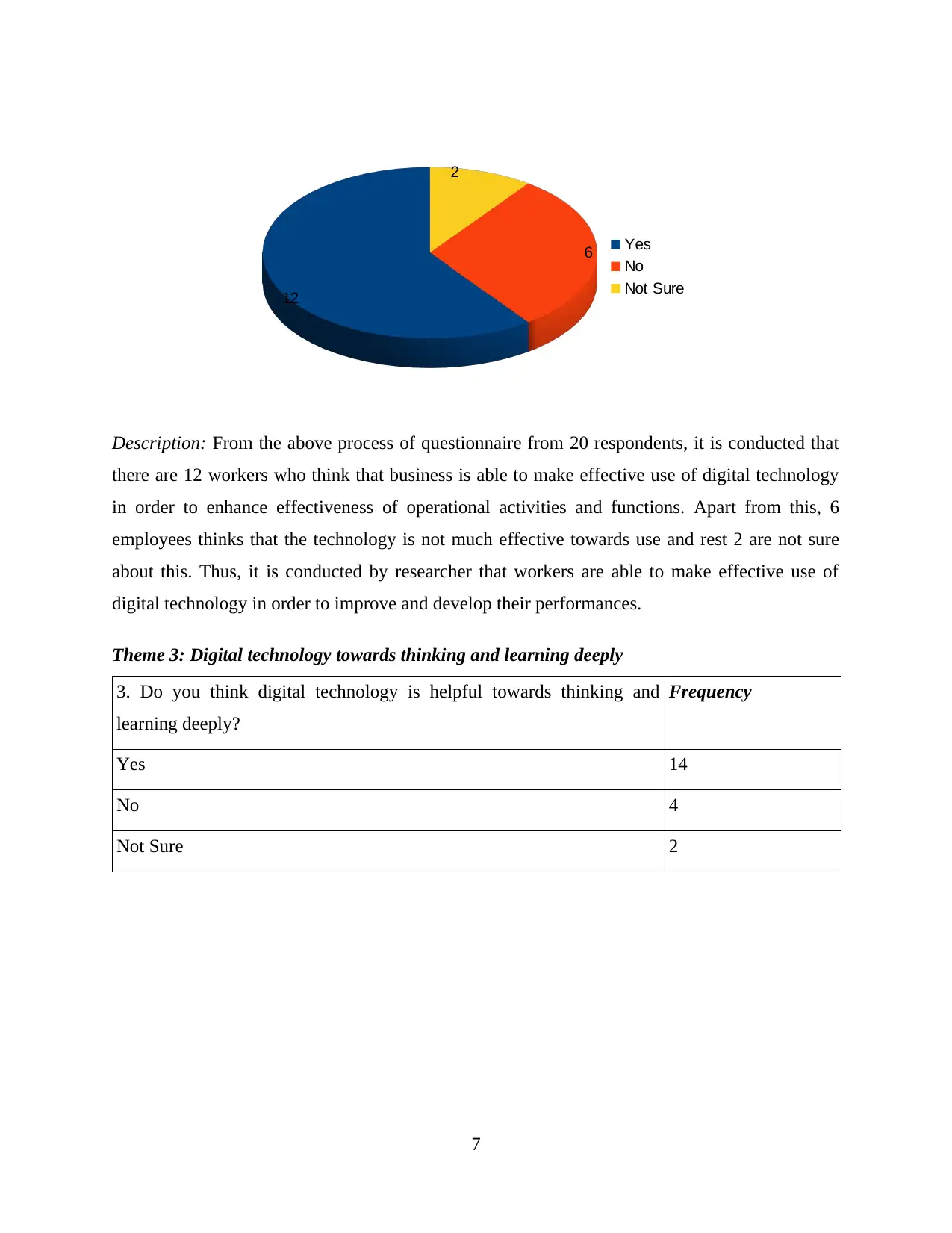
Description: From the above process of questionnaire from 20 respondents, it is conducted that
there are 12 workers who think that business is able to make effective use of digital technology
in order to enhance effectiveness of operational activities and functions. Apart from this, 6
employees thinks that the technology is not much effective towards use and rest 2 are not sure
about this. Thus, it is conducted by researcher that workers are able to make effective use of
digital technology in order to improve and develop their performances.
Theme 3: Digital technology towards thinking and learning deeply
3. Do you think digital technology is helpful towards thinking and
learning deeply?
Frequency
Yes 14
No 4
Not Sure 2
7
12
6
2
Yes
No
Not Sure
there are 12 workers who think that business is able to make effective use of digital technology
in order to enhance effectiveness of operational activities and functions. Apart from this, 6
employees thinks that the technology is not much effective towards use and rest 2 are not sure
about this. Thus, it is conducted by researcher that workers are able to make effective use of
digital technology in order to improve and develop their performances.
Theme 3: Digital technology towards thinking and learning deeply
3. Do you think digital technology is helpful towards thinking and
learning deeply?
Frequency
Yes 14
No 4
Not Sure 2
7
12
6
2
Yes
No
Not Sure
⊘ This is a preview!⊘
Do you want full access?
Subscribe today to unlock all pages.

Trusted by 1+ million students worldwide
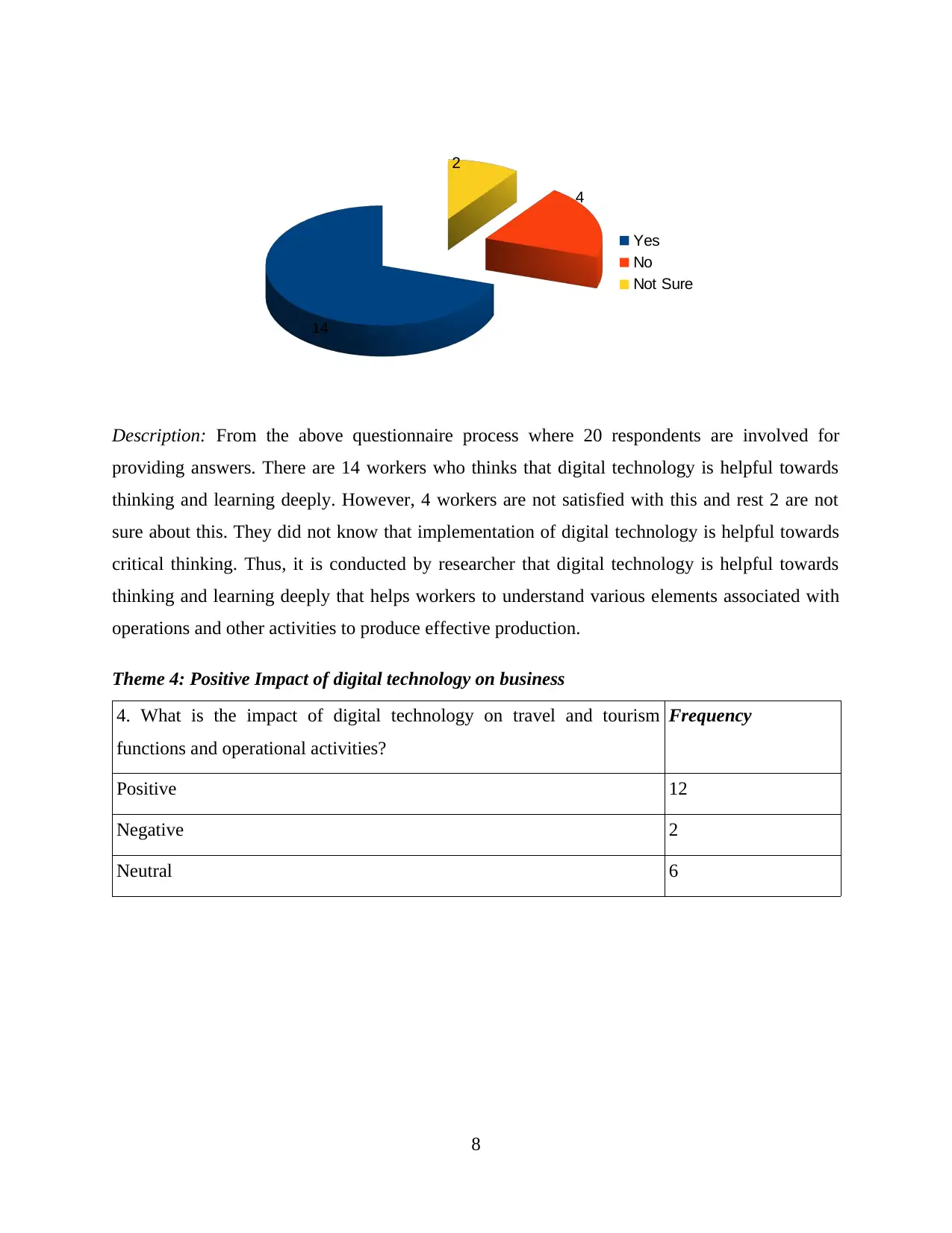
Description: From the above questionnaire process where 20 respondents are involved for
providing answers. There are 14 workers who thinks that digital technology is helpful towards
thinking and learning deeply. However, 4 workers are not satisfied with this and rest 2 are not
sure about this. They did not know that implementation of digital technology is helpful towards
critical thinking. Thus, it is conducted by researcher that digital technology is helpful towards
thinking and learning deeply that helps workers to understand various elements associated with
operations and other activities to produce effective production.
Theme 4: Positive Impact of digital technology on business
4. What is the impact of digital technology on travel and tourism
functions and operational activities?
Frequency
Positive 12
Negative 2
Neutral 6
8
14
4
2
Yes
No
Not Sure
providing answers. There are 14 workers who thinks that digital technology is helpful towards
thinking and learning deeply. However, 4 workers are not satisfied with this and rest 2 are not
sure about this. They did not know that implementation of digital technology is helpful towards
critical thinking. Thus, it is conducted by researcher that digital technology is helpful towards
thinking and learning deeply that helps workers to understand various elements associated with
operations and other activities to produce effective production.
Theme 4: Positive Impact of digital technology on business
4. What is the impact of digital technology on travel and tourism
functions and operational activities?
Frequency
Positive 12
Negative 2
Neutral 6
8
14
4
2
Yes
No
Not Sure
Paraphrase This Document
Need a fresh take? Get an instant paraphrase of this document with our AI Paraphraser
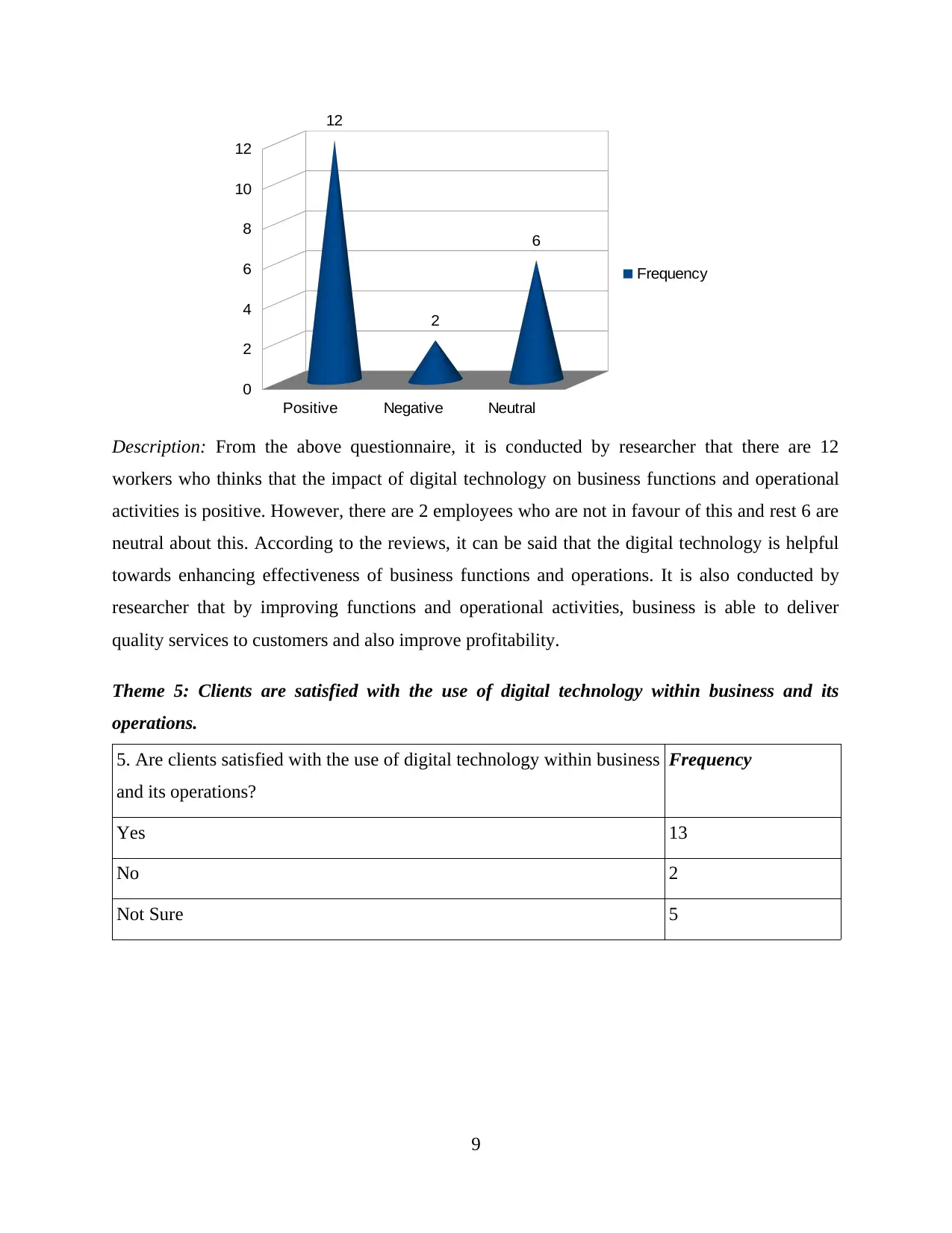
Description: From the above questionnaire, it is conducted by researcher that there are 12
workers who thinks that the impact of digital technology on business functions and operational
activities is positive. However, there are 2 employees who are not in favour of this and rest 6 are
neutral about this. According to the reviews, it can be said that the digital technology is helpful
towards enhancing effectiveness of business functions and operations. It is also conducted by
researcher that by improving functions and operational activities, business is able to deliver
quality services to customers and also improve profitability.
Theme 5: Clients are satisfied with the use of digital technology within business and its
operations.
5. Are clients satisfied with the use of digital technology within business
and its operations?
Frequency
Yes 13
No 2
Not Sure 5
9
Positive Negative Neutral
0
2
4
6
8
10
12
12
2
6
Frequency
workers who thinks that the impact of digital technology on business functions and operational
activities is positive. However, there are 2 employees who are not in favour of this and rest 6 are
neutral about this. According to the reviews, it can be said that the digital technology is helpful
towards enhancing effectiveness of business functions and operations. It is also conducted by
researcher that by improving functions and operational activities, business is able to deliver
quality services to customers and also improve profitability.
Theme 5: Clients are satisfied with the use of digital technology within business and its
operations.
5. Are clients satisfied with the use of digital technology within business
and its operations?
Frequency
Yes 13
No 2
Not Sure 5
9
Positive Negative Neutral
0
2
4
6
8
10
12
12
2
6
Frequency
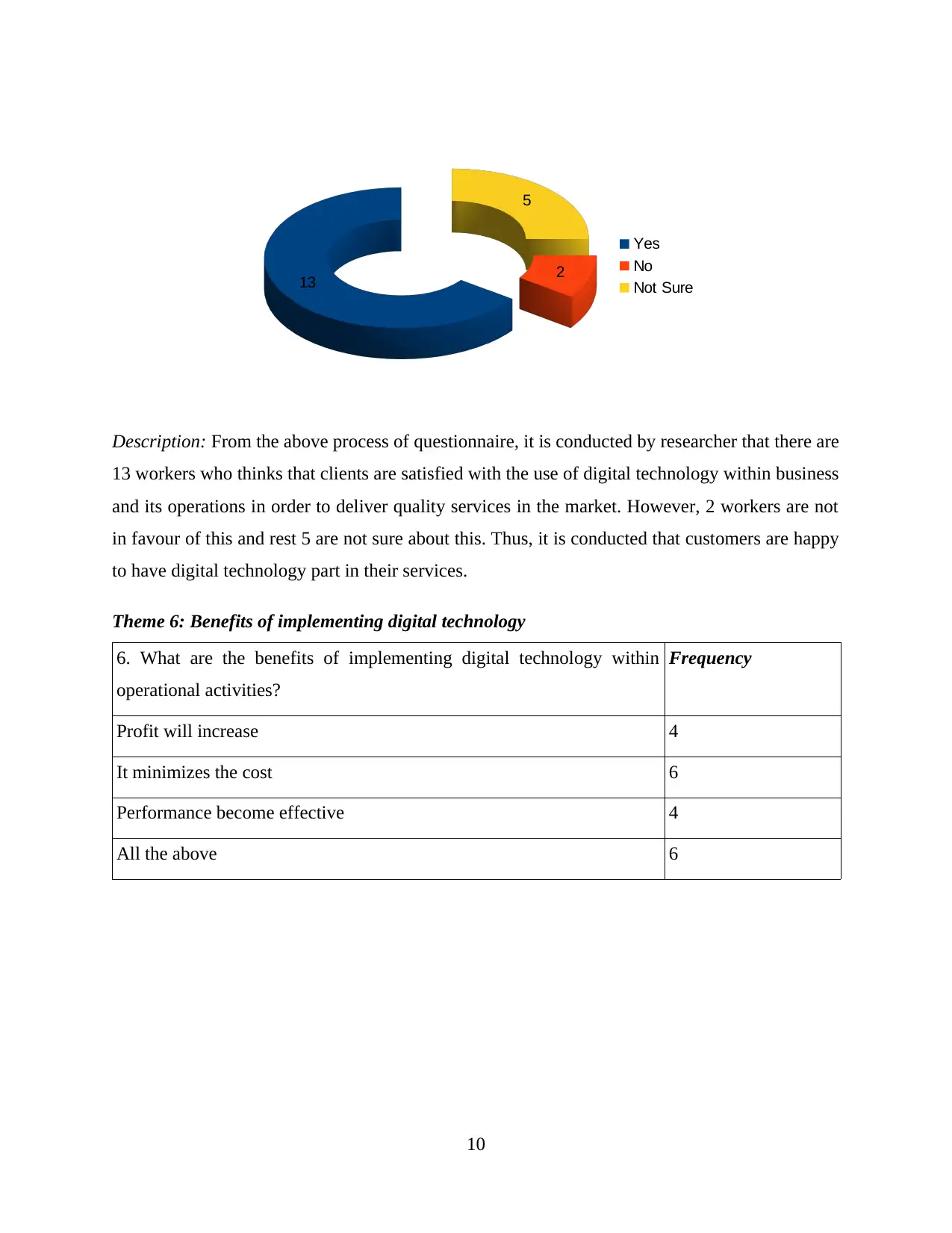
Description: From the above process of questionnaire, it is conducted by researcher that there are
13 workers who thinks that clients are satisfied with the use of digital technology within business
and its operations in order to deliver quality services in the market. However, 2 workers are not
in favour of this and rest 5 are not sure about this. Thus, it is conducted that customers are happy
to have digital technology part in their services.
Theme 6: Benefits of implementing digital technology
6. What are the benefits of implementing digital technology within
operational activities?
Frequency
Profit will increase 4
It minimizes the cost 6
Performance become effective 4
All the above 6
10
13 2
5
Yes
No
Not Sure
13 workers who thinks that clients are satisfied with the use of digital technology within business
and its operations in order to deliver quality services in the market. However, 2 workers are not
in favour of this and rest 5 are not sure about this. Thus, it is conducted that customers are happy
to have digital technology part in their services.
Theme 6: Benefits of implementing digital technology
6. What are the benefits of implementing digital technology within
operational activities?
Frequency
Profit will increase 4
It minimizes the cost 6
Performance become effective 4
All the above 6
10
13 2
5
Yes
No
Not Sure
⊘ This is a preview!⊘
Do you want full access?
Subscribe today to unlock all pages.

Trusted by 1+ million students worldwide
1 out of 18
Related Documents
Your All-in-One AI-Powered Toolkit for Academic Success.
+13062052269
info@desklib.com
Available 24*7 on WhatsApp / Email
![[object Object]](/_next/static/media/star-bottom.7253800d.svg)
Unlock your academic potential
Copyright © 2020–2026 A2Z Services. All Rights Reserved. Developed and managed by ZUCOL.





